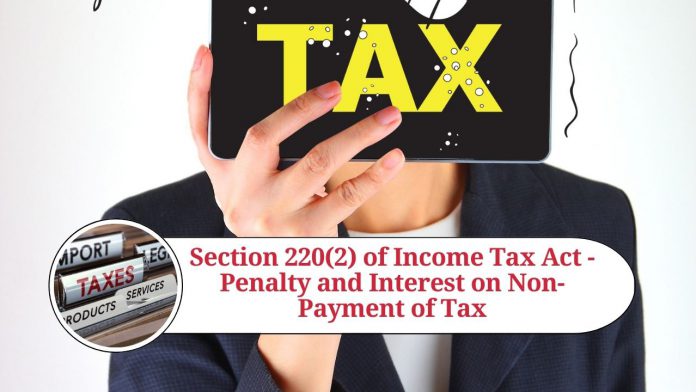The Indian income tax system imposes a legal obligation on taxpayers to pay income tax on their income earned during a financial year. The income tax payable is calculated as per the income tax rates applicable to the taxpayer’s income bracket. The payment of income tax is due within the prescribed time limit. Failure to pay the tax dues within the due date attracts penalties and interest under the Income Tax Act.
Section 220(2) – Overview
Section 220(2) of the Income Tax Act deals with the consequences of non-payment of income tax by a taxpayer. This provision lays down the provisions for levying penalties and interest on a taxpayer who fails to pay the tax dues within the stipulated period.
Interest in Delayed Payment
As per Section 220(2), if a taxpayer fails to pay the entire amount of tax due within the prescribed time limit, he/she shall be liable to pay simple interest at the rate of 1% per month or part of the month for the period of delay in making the payment. The interest shall be calculated from the due date of payment till the date of actual payment.
Penalty for Non-Payment of Tax
If a taxpayer fails to pay the entire tax amount due within the due date, he/she shall be liable to pay a penalty of 1% of the tax amount due for every month or part of the month for which the tax remains unpaid. This penalty shall be levied in addition to the interest on delayed payment.
Penalty for Shortfall in Tax Payment
If a taxpayer pays less than the tax amount due, he/she shall be liable to pay a penalty of 1% of the shortfall for every month or part of the month for which the tax remains unpaid. This penalty shall be levied in addition to the interest on delayed payment.
Voluntary Payment of Tax Dues
It is important to note that the penalty under Section 220(2) is levied only when the taxpayer fails to pay the tax dues voluntarily. In case the taxpayer pays the tax dues voluntarily after the due date, no penalty shall be levied. However, interest shall still be charged on the unpaid tax amount.
Approach to Tax Authorities
In case of any difficulty in making the payment, the taxpayer may approach the concerned tax authorities for an extension of time or for making the payment in installments. The tax authorities may consider such requests on a case-to-case basis and grant appropriate relief based on the facts and circumstances of the case.
Final Conclusion
In conclusion, Section 220(2) of the Income Tax Act is an important provision that seeks to ensure the timely payment of income tax by taxpayers. The levy of penalty and interest under this section serves as a deterrent against non-compliance with the tax laws and promotes voluntary compliance by taxpayers. It is advisable for taxpayers to be aware of the provisions of this section and to comply with the tax laws in a timely and responsible manner.
Read more useful content:
- section 145 of income tax act
- section 10e of income tax act
- section 9 of the income tax act
- section 94b of income tax act
- section 206aa of income tax act
Frequently Asked Questions:
What is Section 220(2) of the Income Tax Act?
Section 220(2) of the Income Tax Act is a provision that deals with the consequences of non-payment of income tax by a taxpayer. It lays down the provisions for levying penalties and interest on a taxpayer who fails to pay the tax dues within the stipulated period.
What is the penalty for non-payment of income tax?
If a taxpayer fails to pay the entire tax amount due within the due date, he/she shall be liable to pay a penalty of 1% of the tax amount due for every month or part of the month for which the tax remains unpaid.
What is the interest rate for delayed payment of income tax?
As per Section 220(2), if a taxpayer fails to pay the entire amount of tax due within the prescribed time limit, he/she shall be liable to pay simple interest at the rate of 1% per month or part of the month for the period of delay in making the payment.
Is a penalty levied on voluntary payment of tax dues after the due date?
No, penalty under Section 220(2) is levied only when the taxpayer fails to pay the tax dues voluntarily within the stipulated period. In case the taxpayer pays the tax dues voluntarily after the due date, no penalty shall be levied. However, interest shall still be charged on the unpaid tax amount.
Can a taxpayer approach the tax authorities for relief in case of difficulty in making the payment?
Yes, in case of any difficulty in making the payment, the taxpayer may approach the concerned tax authorities for an extension of time or for making the payment in installments. The tax authorities may consider such requests on a case-to-case basis and grant appropriate relief based on the facts and circumstances of the case.




















